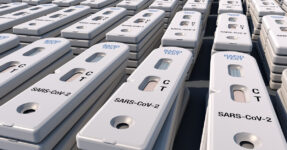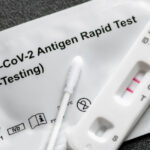Rapid Antigen Tests: Short Supply and High Price Leads to Crime and Thriving Black Market

A man has been charged over the alleged theft of 42,000 Rapid Antigen Tests (RATs) valued at approximately $500,00 from a freight depot in Botany in Sydney’s south-east at around 3.20pm on Tuesday, 18 January 2022.
Three men were arrested at a storage depot in Rosebery at around 4pm the next day and taken into custody.
Two of the men were released while one was charged with obtaining a benefit by deception under section 192E of the Crimes Act 1900 (NSW); and offence carrying a maximum penalty of 10 years in prison.
Police suspect the men of being part of a group who illegally procured the RATs in order illegally sell them through the black market.
The arrested man was refused bail at the police station and will appear in court today.
Investigations are continuing.
Shortage of tests
There is currently a critical shortage of RAT tests right across Australia.
The primary reason for this is the recent move away from Polymerase Chain Reaction (PCR) testing, as well as the shut down of many testing centres.
Tens of thousands of New South Wales residents need these RATs not just to diagnose themselves if they feel unwell, but in order to be able to attend work.
This has led to skyrocketing demand for the tests.
Thriving black market and price gouging
The increase in demand has led to theft and a thriving blackmarket in RATs.
It has also resulted in some retailers over-charging for the tests; leading to a warning by the Australian Competition and Consumer Commission (ACCC) that illegal price gouging comes with helfty fines.
“At the extreme end, we have received reports or seen media coverage of tests costing up to $500 for two tests through online marketplaces, and over $70 per test through convenience stores, service stations and independent supermarkets, which is clearly outrageous,” ACCC Chair Rod Sims stated.
“There are several businesses that have repeatedly come to our notice thanks to the information provided by the public. We are asking those businesses to urgently explain the prices they are charging.”
Regular people pay the price
And it’s hardworking Australian residents paying the price.
The NSW Government recently unveiled a return-to-school plan under which children and teens returning to school at the end of January will be required to test twice-weekly in order to attend face-to-face learning.
This is going to be a considerable, and unforeseeable expense for families. Tests are supposed to cost about $10 each, but even at the ‘average’ price, for a family with two children, that’s an additional $40 a week they need to add to the household budget at a time when many are strapped for cash as a result of lockdowns in the previous two years which have created economic hardship for many.
People on low-incomes or Centrelink benefits are unlikely to be able to afford RAT testing kits at all.
It’s understood that both the Federal Government and the NSW Government have recently purchased millions of RAT tests, but how or when they will be made available is not clear.
And the Prime Minister has maintained that RAT tests will not be free, despite calls for him to make them free, or at least exempt from GST which would bring the price down.
In the meantime, supermarket and chemist shelves remain bare. The current issues with staff shortages affecting supply chains across many areas will likely make distribution even more difficult even when the tests eventually arise.
Dishonestly obtaining a benefit by deception
Police are yet to release the details of the charged man’s alleged role in the theft of RATs from the Sydney freight terminal.
However, it is understood he is alleged to be part of a group of men who took steps to illegally procure the items.
His charge of dishonestly obtaining a benefit by deception comes under the banner of fraud under section 192E of the Crimes Act 1900.
The section provides that a person who, by any deception, dishonestly:
- Obtains property belonging to another, or
- Obtains any financial advantage or causes any financial disadvantage,is guilty of the offence of fraud.
In order for a person to be be convicted of fraud, the prosecution must prove that he or she:
- Obtained a financial advantage or caused a financial disadvantage; and
- That the financial advantage or disadvantage was obtained as a result of a deception or act of dishonesty.
The legal definitions
The law has a definition for obtaining a financial advantage that is more than just its natural meaning.
It includes obtaining a financial advantage for yourself, or inducing another person to do something that results in you obtaining a financial advantage. And the financial advantage does not have to be permanent, and can be temporarily obtained.
The definition for causing a financial disadvantage is explained as causing a financial loss to another person, or when you induce another to do something that causes a financial disadvantage.
The prosecution must prove that there was an element of deception or dishonesty in the act.
What is ‘dishonesty’ and ‘a deception’?
Section 4B of the Crimes Act makes clear that whether the conduct amounts to ‘dishonesty is to be determined by the trier of fact – whether the magistrate in the Local Court or the jury or judge sitting alone in a higher court – according to the standards of ordinary people and known by the defendant to be dishonest according to the standards of ordinary people.
Section 192B of the Act defines ‘deception’ as any intentional or reckless deception, by words or other conduct, as to fact or as to law, including:
(a) a deception as to the intentions of the person using the deception or any other person, or
(b) conduct by a person that causes a computer, a machine or any electronic device to make a response that the person is not authorised to cause it to make.
Defences to fraud
In addition to having to prove all of the elements of fraud, the prosecution must also disprove beyond reasonable doubt any legal defences that are validly raised.
These defences include duress and necessity.
Penalty for fraud
The maximum penalty is imprisonment for 10 years where the case is finalised in the District Court, or 2 years where it is dealt with in the Local Court.
Going to court for fraud?
If you are going to court for an offence of fraud, call Sydney Criminal Lawyers anytime on (02) 9261 8881 to arrange a free initial appointment with an experienced defence lawyer who will advise you of your options and the best way forward, and fight for the best possible result in the circumstances.








